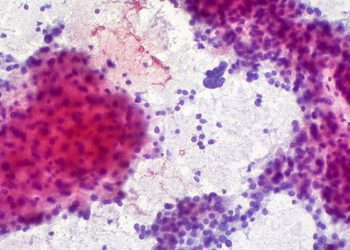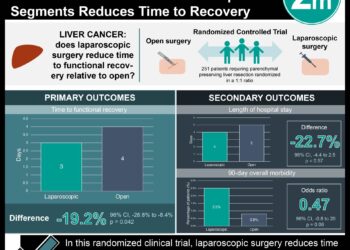Lipophilic statins associated with reduced risk for hepatocellular carcinoma
1. In this prospective propensity score (PS)-matched cohort study, lipophilic statins were found to significantly reduce incidence and mortality of hepatocellular carcinoma (HCC).
2. No significant association was found between use of hydrophilic statins and HCC risk.
Evidence Rating Level: 2 (Good)
Study Rundown: The mortality for hepatocellular carcinoma is increasing at a rate faster than any other cancer, and the incidence has tripled in the United States since the 1970s. Accumulating data suggests that the usage of statins may improve clinical outcomes for HCC, however the impact that statins have on risk and survival has not been previously investigated. The purpose of this study was to examine the effect of both lipophilic and hydrophilic statins on HCC risk and mortality. The use of statins was defined by presence of a prescription for 30 or more cumulative defined daily doses (cDDDs). The study outcomes were obtained from the Cancer Register and Cause of Death Register. The results of this study demonstrated that compared with matched non-users, those who used statins had a significantly lower 10-year HCC risk. No association was found between use of hydrophilic statins and reduced HCC risk. One limitation of this study was that the Swedish registers lack information on conditions that may be a risk for HCC such as obesity and information on smoking, HBC DNA, fibrosis stage, HCC screening and HCV eradication. Nevertheless, as the first ever population-based cohort to study the impact of statins on risk and mortality of HCC patients, the findings suggest that lipophilic statin use is associated with HCC risk and death.
Click to read the study in Annals of Internal Medicine
Relevant Reading: Statin Use After Diagnosis of Hepatocellular Carcinoma Is Associated With Decreased Mortality
In-Depth [retrospective cohort]: This population based, prospective propensity score (PS)-matched cohort study included 16,668 adults. Of these, 8334 initiated statin use, with 6554 and 1780 being lipophilic and hydrophilic, respectively. Patients were included if they were at least 18 years of age, had a confirmed diagnosis of viral hepatitis, and had filled a statin prescription between July 1, 2005 and December 31, 2013. Excluded participants were those who had a statin prescribed prior to HBC or HCV infection, those with HIV, and those who had both lipophilic and hydrophilic statins prescribed during follow up. The 10-year HCC risk for statin used when compared to non-statin had an absolute risk difference (RD) of 8.1% versus 3.3%. The adjusted subdistribution hazard radio (aHR) was 0.56 [CI, 0.41 to 0.79]. Non-hydrophilic statin uses had an absolute risk difference of 8.0% versus 6.8% and aHR of 0.95[CI, 0.86 to 1.08] for statin users and non-statin users, respectively. Further, it appeared that there was an inverse dose dependent risk association between statin use and HCC risk. 10-year HCC risk in statin users was the lowest when there was 600 or more lipophilic statin cDDDs (8.4% versus 2.5% RD and aHR=0.41[CI 0.32 to 0.61] Lastly, 10-year mortality was significantly lower in both lipophilic (15.2% versus 7.3% RD, and -7.9 percentage points [CI -9.6 to -6.2] and hydrophilic statin users (16.0% versus 11.5% RD and -4.5 percentage points [CI -6.0 to -3.0].
Image: PD
©2019 2 Minute Medicine, Inc. All rights reserved. No works may be reproduced without expressed written consent from 2 Minute Medicine, Inc. Inquire about licensing here. No article should be construed as medical advice and is not intended as such by the authors or by 2 Minute Medicine, Inc.







